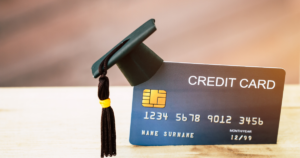Whether you’re a student heading off to college or the parent of one, it’s a good idea to get some financial basics squared away before taking that first step toward independence. On the first day a student could be picking up books, making friends, and hitting the cafeteria. A few weeks later they’re selling books for video games, doctoring IDs, and eating ramen noodles 4 times a day.
You should have a grasp on these topics before you head out on your own… down the only road you’ve ever known (Whitesnake? Anyone?). It will help you manage your money better and avoid credit card debt.
Credit Cards:
When I headed off to college it was still legal for 18 year-olds to get credit cards. So that’s when I got my first. I hardly ever used it while at school and that’s a good thing, since I didn’t incur any debt. The bad thing is that I could’ve been using it to build up my credit. Back then I didn’t know anything about building a credit history. If I did, then I probably would’ve used the card more often and just paid off the balance each month.
There are credit cards available that are targeted specifically to students, who have little or no credit history. Lenders can be more lenient with student cards since they require a co-signer (or proof of capacity to repay any debt). A student’s lack of credit history is helped out by that of the co-signer. Other than that, student-geared credit cards aren’t very different from any other card in terms of interest rate (APR) and reward offerings. Just be aware that how it is used will affect both the card holder’s and the co-signer’s credit report. Our credit counseling advice is to use the card wisely, and to pay off the full balance each month. A good rule of thumb… Don’t spend money you don’t have. You may ask, “Why use the credit card if I have the cash?” Excellent question. The reasons are A) to build up your credit history; and B) to reap the rewards that the card offers, like cash back or points towards gas.
Just a quick note to the parents… Don’t just hand over the credit card, say it’s “for emergencies” and foot the bill. Take this opportunity to teach your student about credit and the repercussions of abusing it.
Banking:
I had an account with a credit union in my home town. They had no branches near my college. This made withdrawals a hassle. ATM fees almost every time I needed cash. A good idea would have been to open another account for my spending money in a more convenient bank. One with branches and ATMs nearby. A national bank is also convenient in case you need your parents to make a deposit for you from home.
You can also keep track of your balance and activity on the bank’s website. This leads us to another topic…
Budgeting:
In the digital age, budgeting should be easy. You don’t need to balance a check book… just check your activity and balance online. You can even pay all your bills online (it’s actually really easy to set up right through your bank’s website).
The next step is to find out what your total monthly expenses are, and how much money you have left over to save and/or spend. Try filling out a budget worksheet. This is all great to keep track of your money, but you still need to be in control of how you spend it.
With a basic understanding of these financial lessons, a college student should be ready to hit campus without going broke. Again, it’s up to the student to make responsible financial choices.
If you’re struggling to pay off debt, ACCC can help. Schedule a free credit counseling session with us today.







